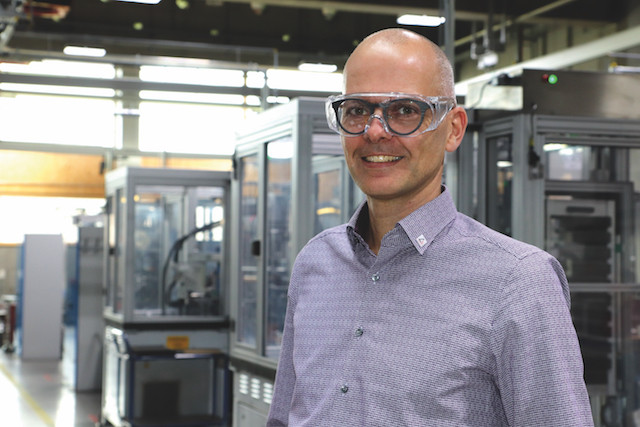So, what exactly is being transformed? The current “state of the art industry model is a high degree of automation in your enterprise. Industry 4.0 goes one step beyond. It is not just automatised production, now it’s also the end customer being implicated in the whole” production process, said Laurent Federspiel, assistant manager in charge of Industry 4.0 and quality at Ceratizit.
The company, based in Mamer, provides materials for machine tools used in the automotive, aerospace, energy and several other industries. “We are working in a global world, and like every industry, you have to be the best, fastest and cheapest to keep your customers happy.”
For Ceratizit, Industry 4.0 means creating direct digital connections with clients, stated Federspiel. In the future, “if the customer has a certain idea, the customer themselves will basically have access to our machines, virtually speaking. He’s able to define, at his desk, how the product will look like… the information system gives him an immediate response if it’s feasible and at what price.” If the customer decides to proceed with the order, they hit the “yes” button and then “the production line produces it”, he said.
That’s the future vision. But it’s not a straight line to get there. “You can imagine, a production process has many, many parameters that you have to control. Now that’s done by engineers and operators, but in the future we’ll try to reflect this knowledge in a digital system” in order to give customers that virtual access, he said.
Ceratizit has started several Industry 4.0 projects, including one with the Luxembourg Institute of Science and Technology that focuses on premium hot rolls made of cemented carbide, which are used in steel manufacturing. “It’s not a complicated product, but digitalisation is very complicated” because of the precision required and the large number of customer variables. “Once we are successful in this one, we could then attack other” product lines.
The move to Industry 4.0 requires a substantial investment. Ceratizit is spending a total of €3.6m on its various projects “over a couple years”, stated Federspiel. One notable capital outlay was for a high precision 3D scanner imported from Sweden that captures a raft of detailed data on each step of the production process, along with related software and training for employees on how to use all the new kit.
Altogether, “roughly one-third of the overall budget is allocated to hardware” like the scanner, with another third going to training and a third for consulting services, according to Parwez Farsan, the firm’s PR manager.
Customers and employees
Cebi, a Steinsel-based supplier of automotive and household appliance components, also selected a flagship product to trial its transition to Industry 4.0 and aims to expand from there. Last year the firm embarked on a research partnership with the University of Luxembourg’s Interdisciplinary Centre for Security, Reliability and Trust (SnT) and DataThings, a Luxembourg artificial intelligence startup.
“Firstly, this project aims at significantly optimising our production and supply chain processes in order to reach the satisfaction of clients who are more demanding, in terms of technical specs, quality and lead time,” according to Paul Elvinger, a member of Cebi’s executive board. “Secondly, we need to better serve our own employees, making their work more efficient, less laborious, while enabling them to increase their digital competences [in order] to keep the Luxembourg site competitive.”
“For implementing the Industry 4.0 project, we decided to work on our flagship product, i.e., temperature sensors, as it is a widely used and customisable product in terms of shape, weight, specifications, etc.,” he explained. “The project will cost several million euros in the upcoming years. By starting a research project with our partners, Cebi obtained a financial aid from the Luxembourg state, which highly encourages initiatives related to digitalisation, especially in the industrial sector.”
While it is trialling new technologies at its other sites, “the main focus of the Industry 4.0 project is at Cebi Luxembourg as we are expecting to develop the global architecture from there.”
Training, data challenges
Automatisation does not automatically mean shedding staff, stressed Federspiel. He cited the example of banks, which have collectively added headcount since the introduction of ATMs. But tomorrow’s workforce needs to be “much smarter and efficient”. “The jobs you know today will probably not be the jobs we will have in the future. People need to be [trained] to adapt to the new work environment. It’s a long-term process.” Ceratizit is “constantly scouting” for training courses.
“What is new for us and other companies is that Industry 4.0 is becoming a challenge in the treatment of the amount of data,” reckoned Federspiel. Currently, quality is judged on the finished product, he said. But the software is collecting reams of data about individual machines, such as a temperature, energy consumption and process time. There’s value in that data, but it’s not always easy to find it.
For example, “if a machine consumes too much energy, there might be a problem. If a machine needs more energy to produce [a piece], it might be that a tool is worn out” and needs replacing. “Machines provide more data” but the numbers need to be distilled down to “a layer where we, as humans, can interpret this data”.
